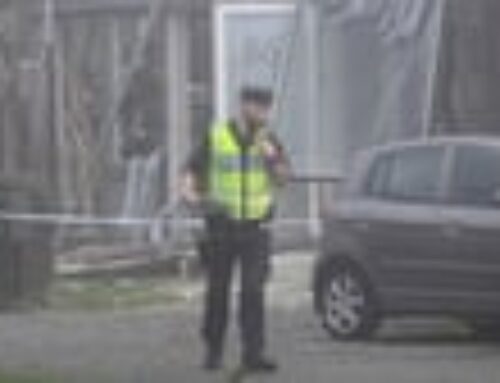Craig Taylor felt a mix of thrill and dread when he sat down beside the leader of the most deadly gang operating in Ireland and the UK and began secretly filming.
Notoriously observant and adept in evaluating if he was being watched or followed, Christopher Kinahan Sr was one of the most-wanted criminal figures in the world, founder of a cartel ranked alongside the Italian mafia and the brutal Los Zetas in Mexico.
Remarkably, on that occasion, Kinahan didn’t appear to notice the plain-clothes officer from the UK’s National Crime Agency. And Taylor acquired fresh intelligence in the attempt to dismantle the Kinahan cartel, which has generated more than £850m in proceeds from drugs, firearms and extortion.
Last Tuesday, the NCA’s intelligence on Kinahan was among the evidence used by US officials to announce financial sanctions against the Kinahan organised crime group (KOCG), along with a $5m reward for information leading to the arrest or conviction of Christopher Kinahan Sr and other senior members.
Currently, the 65-year-old is living at an opulent address in Dubai, close to the Palm Jumeirah development where his son, Daniel, is said to oversee criminal transactions. Daniel has also used his wealth to become one of the most influential figures in boxing, with links to individuals such as world heavyweight champion Tyson Fury.
With investigations under way, the Observer has interviewed three veteran frontline NCA officers tasked with collating information on a transnational crime syndicate known to have murdered at least 12 people, mainly their rivals. On condition of anonymity, the operatives reveal the challenges and dangers attached to getting close to the Kinahan cartel.
Not only are Kinahan members highly attuned to identifying police who may be tracking them, but police face the genuine risk of corruption within law enforcement with individuals on its payroll and others vulnerable to bribes.
The officers, some of whom have tracked the rise of the Kinahan group for 15 years, say the cartel uses high-level counter-surveillance techniques, which NCA sources believe are “highly likely” to have been passed down from IRA operatives and honed during the Troubles. On at least two occasions, NCA officers tracking Kinahan activity have been approached and intimidated by cartel members.
It is well established that the cartel has amassed significant lethal weaponry. In 2017, in a village outside Dublin, gardaí found bespoke “murder kits” linked to the group: loaded revolvers and ammunition for members to deploy at a moment’s notice.
NCA officer Taylor (not his real name) has been tracking the cartel since 2006. He said: “Colleagues have been approached by some very, very undesirable people, some in the company of convicted armed robbers, others with affiliations to political groups,… and have been challenged. It’s very intimidating. These people are saying: ‘We know who you are.’
“It’s not a good place to be, it’s very uncomfortable but we work under the risk of compromise. With the Kinahans there have been compromises. It hasn’t compromised the investigation but it’s compromised them [the officers] as an individual, which at the time put them in a very difficult position.”
Incidents where police investigating the group have been placed at risk include one occasion where colleagues had to rescue an officer. “During an investigation peripheral to the Kinahans they were chased down the road with a knife. Another was chased in a car,” said an NCA operative.
Investigators also reveal how the Kinahan cartel has invested some of its wealth to employ specialist advisers who train members in the latest “tradecraft” techniques to help evade detection. Similarly, technology such as sophisticated tracking devices is regularly employed by the criminals to follow consignments of drugs and guns – and possibly targets.
Matt Horne, deputy director of investigations at the NCA, said the adoption of counter-surveillance measures by Kinahan members was two-fold. “You need to be able to find out where your opponents are, when they might be vulnerable. But if you understand how to do surveillance, you learn how to spot surveillance.
“That makes it quite awkward for us. When some of the tricks of the trade are known it makes it harder to put people under surveillance,” added Horne, who is directing the NCA operation against the Kinahan crime group.
Last month, he celebrated the jailing of Thomas “Bomber” Kavanagh, who ran the UK arm of the Kinahan’s criminal empire. The 54-year-old, who lived in a fortified mansion with bulletproof windows in Tamworth, Staffordshire, was imprisoned for orchestrating multimillion-pound drug shipments.
Although the NCA has been investigating the Kinahan organisation since 2006, it took a full decade for the extent of its capacity for violence to become fully evident. More precisely, it was only after gunmen armed with AK-47s stormed a boxing weigh-in at a Dublin hotel on 5 February 2016. During the guerrilla-style assault, Kinahan gang member David Byrne was killed and another high-ranking member was shot in the leg.
Yet the attack’s principal target – Daniel Kinahan – had left moments before the gunmen, some disguised as elite gardaí, and one dressed as a woman, arrived.
Kinahan swore revenge against the rival Dublin-based Hutch gang, which was responsible. Since the brazen attack, 18 people have been murdered as a result of the feud, most of them by the Kinahan cartel.
In addition, officers have linked the Kinahan syndicate to a further 23 attempted murders. Gardaí have also intervened on 46 occasions following “threat to life” intelligence, often involving hitmen. NCA officers have prevented another eight “threat to life” incidents involving the cartel in the UK.
The Kinahans’ alertness to police surveillance techniques has also heightened the danger to investigating officers in other ways, with sources saying a constant fear is being mistaken for rival gangsters.
“When Kinahan members are doing anti- and counter-surveillance for rival gangs, and we are out and about, they might not recognise us,” said an NCA officer. “They don’t necessarily know the good guys from the bad – and that can put us in a difficult position.”
Compounding policing difficulties are the steps that the Kinahan leadership take to ensure they are far removed from criminality.
Not only are criminal proceeds distributed among a labyrinthine network of shell companies, and communications are encrypted, but figures like Christopher and Daniel Kinahan have relocated from Dublin to Dubai, which has no extradition agreement with Ireland or the UK.
“You won’t catch them running out of a car with five kilos of cocaine, that’s for sure. They’re far removed from that level of criminality: the cartel structure is extremely hierarchical,” said an NCA investigator.
This, says Horne, may have helped convince senior Kinahan figures that they were “untouchable”, which is why Daniel Kinahan has felt sufficiently emboldened to become one of the most influential figures in boxing, with individuals like Fury publicly praising him.
For police, however, getting close to the founder of the Kinahan cartel offers a constant challenge.
“Most assignments have provided various levels of bum twitching. Still, I’ve managed to get up close to the main man [Christopher Kinahan Sr], who fortunately didn’t pay any attention to me because I was filming. But I was quite nervous,” said Taylor, who is not permitted to share further details of the encounter for security reasons.
There are plenty of reasons to be cautious. In a European context, the violence of the Kinahan cartel is striking: its feud with the Hutch gang is one of the continent’s bloodiest.
“The key difference is the high level of violence they use. That really marks them out, along with the lengths they go to to make sure that vendettas are followed through,” said one of the NCA officers.
Horne describes the Kinahans as a “high threat, high harm” organisation that plays a significant role in the supply of drugs to Europe.
Yet despite the cartel’s ruthlessness in eliminating rivals, the NCA has never found any intelligence indicating that the Kinahans have intended to target police.
Danger, though, does come from the ranks of police themselves, with NCA sources admitting that the cartel has both exploited and benefited from high-level corruption.
“We’ve always been acutely aware of the risk of this group in particular. Operational security is paramount due to their wealth and how they seek to protect themselves,” said a source.
However, Horne points out that the fact that international sanctions were announced – measures that required complex coordination with global partners – and the Kinahan cartel were apparently oblivious, is a positive sign.
“They had no indication this was coming,” said Horne.
Preparations to remove the senior levels of the Kinahan cartel from international banking systems have been under way for years, with the NCA and international law enforcement partners raising the issue of sanctions with US officials in September 2019.
Further sanctions may yet follow, with police investigating the group on a number of fronts. At the same time, pressure is growing on the UAE authorities to act against Kinahan, though the NCA stresses that it has an “excellent relationship” with the Gulf state.
“It’s not finished by any stretch, not until we fully dismantle this cartel,” said Taylor.





